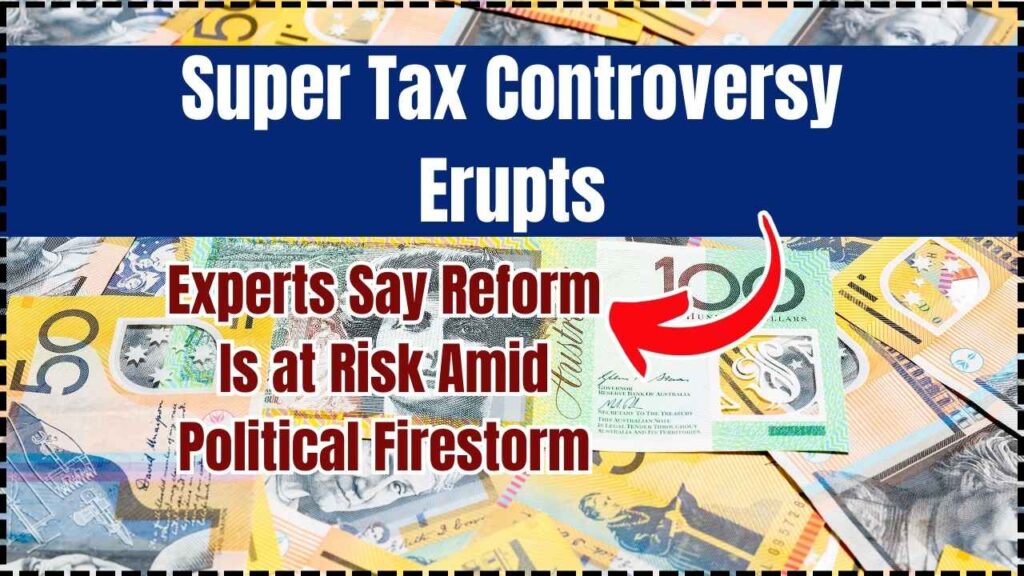Super Tax Controversy Erupts: The Australian government is shaking up the retirement savings game with a new superannuation tax reform set to roll out on July 1, 2025. This change targets super balances over $3 million, introducing a 30% tax on earnings, including unrealized capital gains. While the government says it’s aimed at the wealthiest 0.5% of Aussies, critics argue it could have broader implications over time. In this article, we’ll break down the reform, its potential impact, and what you can do to prepare.
Super Tax Controversy Erupts
The upcoming superannuation tax reform represents a significant shift in Australia’s retirement savings landscape. While aimed at making the system more equitable, it’s essential for Australians to understand the changes and prepare accordingly. Consulting with financial advisors and staying informed will be key to navigating this new terrain.

| Feature | Details |
|---|---|
| Start Date | July 1, 2025 |
| Affected Individuals | Approximately 80,000 Australians (0.5% of super account holders) |
| Tax Rate | Additional 15% on earnings over $3 million, totaling 30% |
| Includes Unrealized Gains | Yes |
| Indexation of $3M Threshold | No |
| Projected Revenue | $2 billion annually; $40 billion over a decade |
| Criticism | Potential impact on younger generations, investment in green tech, and fairness concerns |
| Support | Aimed at making the super system more equitable and sustainable |
| Official Resource | Treasury.gov.au |
Understanding the Superannuation Tax Reform
What’s Changing?
Starting July 1, 2025, the government will impose an additional 15% tax on earnings from superannuation balances exceeding $3 million. This means that earnings above this threshold will be taxed at a total rate of 30%, up from the current 15%.
Notably, the tax applies to unrealized capital gains, meaning you’ll be taxed on the increase in value of your investments, even if you haven’t sold them. This approach is uncommon and has sparked significant debate.
Who’s Affected?
Initially, about 80,000 Australians—roughly 0.5% of super account holders—will be impacted. However, since the $3 million threshold isn’t indexed to inflation, more individuals could fall into this category over time, especially younger Australians who are still building their retirement savings.
The Debate: Pros and Cons
Arguments in Favor
- Equity and Sustainability: Proponents argue that the reform makes the super system more equitable by reducing tax concessions for the wealthiest savers.
- Revenue Generation: The additional tax is expected to raise $2 billion annually, which could be used to fund public services like healthcare and education.
Criticisms
- Taxing Unrealized Gains: Critics, including former Reserve Bank Governor Philip Lowe and ex-Treasury Secretary Ken Henry, argue that taxing unrealized gains is economically unsound and could discourage investment.
- Impact on Investment: Industry leaders warn that the reform could deter investments in sectors like renewable energy, as the increased tax burden might make such investments less attractive.
- Fairness Concerns: The lack of indexation means that over time, more Australians, including younger generations, could be affected, raising concerns about intergenerational fairness.
Practical Steps to Prepare for the Super Tax Controversy Erupts
1. Review Your Super Balance
If your super balance is approaching or exceeds $3 million, consult with a financial advisor to understand how the new tax could impact you.
2. Consider Diversifying Investments
Diversifying your investments outside of superannuation might help mitigate the impact of the new tax.
3. Stay Informed
Keep up to date with official resources like Treasury.gov.au and consult with financial professionals to navigate the changes effectively.
Breaking Down the $3,000 Centrelink Payment — What’s Really Happening in 2025
Power Bill Relief Is Coming for Aussies – Here’s Exactly When You’ll Get It
Frequently Asked Questions (FAQs)
Q1: Will the $3 million threshold be adjusted for inflation?
A: No, the threshold is not indexed to inflation, meaning more individuals could be affected over time as their super balances grow.
Q2: Does the tax apply to all super balances?
A: No, only the portion of your super balance exceeding $3 million will be subject to the additional 15% tax.
Q3: When does the new tax take effect?
A: The reform is set to begin on July 1, 2025.











